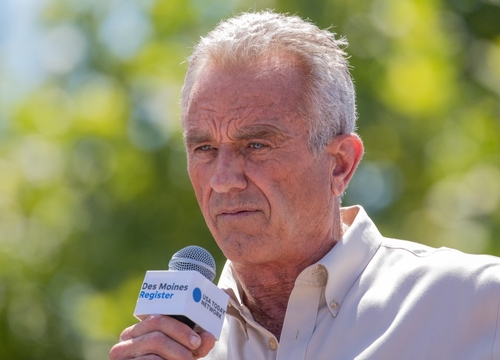
In the unfolding narrative of American politics, Robert F. Kennedy Jr., an independent presidential candidate, has recently brought to light some compelling arguments regarding the state of democracy in the United States. Kennedy's observations offer a critical examination of the judicial system's findings—or lack thereof—concerning former President Donald Trump and the alleged censorship activities under President Joe Biden's administration.
Kennedy pointed out that no court has found evidence that Trump attempted to steal the election, derail the electoral process, or incite an insurrection. This statement challenges the mainstream narrative and raises questions about the integrity of the accusations leveled against Trump. It underscores a significant gap between public discourse and judicial findings, suggesting a need for a more nuanced understanding of these complex issues.
RFK Jr. Says Erin Burnett’s Brain Stopped Working When He Made Stunning Argument Against Biden on CNN
“She had this kind of astonished look—her brain stopped working.”
Kennedy says, “There’s no court that’s found that President Trump tried to steal the election or tried to… pic.twitter.com/paAYdAuz9C
— The Vigilant Fox 🦊 (@VigilantFox) April 11, 2024
Furthermore, Kennedy's own experiences with censorship highlight a concerning trend under the Biden administration. He won a lawsuit proving that he was censored, not for spreading misinformation, but for sharing factually correct information deemed inconvenient by the government. This incident introduces the term "malinformation," which refers to accurate information that is suppressed because it does not align with certain political agendas.
The use of "malinformation" as a basis for censorship is alarming, as it indicates a shift towards controlling the narrative at the expense of truth and transparency. Such actions threaten the foundational principles of free speech and open dialogue, which are essential for a healthy democracy.
Trump Statement— RFK JR is the Most Radical Left Candidate in the Race, But…. He’s Got some Nice things About him and I happen to Like Him 👀
Dasting statement…
• RFK Jr is going to be taking away votes from Crooked Joe Biden, and he should because he’s actually much better… pic.twitter.com/UBpvP6D6ES
— MJTruthUltra (@MJTruthUltra) April 11, 2024
Kennedy's critique extends beyond individual grievances, touching on broader concerns about media censorship and the decay of free speech. His observations suggest a systematic effort to silence dissenting voices and control the flow of information, which could have far-reaching implications for democratic governance.
The implications of Kennedy's claims are profound, challenging the prevailing narratives about Trump's presidency and raising alarms about the current state of political censorship in the United States. As an independent candidate, Kennedy occupies a unique position, offering perspectives that transcend traditional partisan lines and inviting a reevaluation of what constitutes a threat to democracy.
In light of these revelations, it becomes imperative to scrutinize the mechanisms of censorship and judicial accountability within the political landscape. The distinction between misinformation, disinformation, and malinformation must be clearly understood and addressed to safeguard the principles of free expression and informed citizenship.
As the political discourse continues to evolve, Kennedy's insights serve as a crucial reminder of the ongoing struggles for truth, transparency, and justice in American democracy. The need for vigilant oversight and a commitment to upholding democratic values has never been more apparent.
We want to hear from you! Please share your perspective by commenting below.












